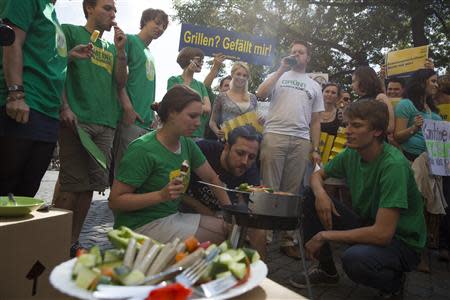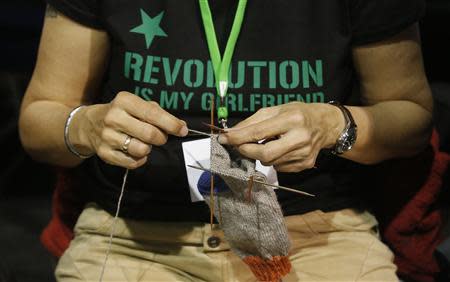Greens dream of power fading as German election nears
By Erik Kirschbaum BERLIN (Reuters) - Sven Suska looked like a typical Greens voter as he sat in his sandals and shorts in the Berlin sun eating a fruit salad, but the computer programmer is abandoning the party he says is now too much part of the establishment. Like other Germans once attracted to the world's most successful pro-environment party, Suska is now turned off by the Greens -- and his defection helps explain a sudden drop in support before Germany's September 22 election. "The Greens have this 'ecological dictatorship' feeling about them now," says Suska, 45. "I used to always vote Greens. But not anymore. No one likes to be told what to do. It feels like the Greens are going to make everything more expensive." Support for the Greens, which traces its roots to the peace movement of the 1970s, hit a high of 23 percent in 2011 after the Fukushima disaster in Japan boosted the appeal of its anti-nuclear message. Within weeks of the tragedy, the Greens stunned Chancellor Angela Merkel by winning control of the state of Baden-Wuerttemberg, long a conservative stronghold. As recently as July, the party was polling a robust 15 percent, well above its 2009 result of 10.7 percent. But over the past two months, the Greens have seen their support crumble to 10 percent, a four-year low. The collapse, in the most crucial phase of the campaign, appears to have doomed what faint hopes the party had of returning to power with the Social Democrats (SPD), with whom it ruled from 1998 to 2005. That government, which included charismatic Greens leader and foreign minister Joschka Fischer, wrote laws to turn off nuclear power by 2020 and made Germany a world leader in renewable energy. Despite their fondness for fast cars, Germans have long had a green streak and a deeper attachment to their trees and forests than many other Europeans. Green issues featured in German election campaigns long before the Greens party was established in 1980. Their strength forced other parties to adopt green policies as well. Much of the party's fall in popularity can be traced to a series of self-inflicted wounds. VEGGIE DAY One big problem is the lingering suspicion the Greens want to tell people what to do: drive more slowly, take the bus, turn off lights, turn down the heat, ban large livestock farming. Their light-hearted idea for a "Veggie Day", where Germans would skip meat once a week, has been mocked in the media and by other parties. The rival Free Democrats (FDP) went so far as to organise a barbecue to annoy the Greens. Proposals to cut city speed limits and put an upper limit on motorways have also alienated some supporters. "Germans don't have a sense of humour when it comes to cars and meat," said Yvonne Seiler, a secretary and Greens backer. Gero Neugebauer, a political scientist at Berlin's Free University, said: "The Greens scare away a lot of voters and their ideas just don't excite people anymore. People don't understand their message." The party has also been hurt by its vow to raise taxes on people earning over 80,000 euros (67,567.57 pounds) annually -- a plan that would hit many of its own, increasingly affluent, supporters. Compounding the problems has been a public discussion over its tolerance of paedophilia in the "free love" early days of the party. The Greens have long since distanced themselves from this dark chapter in their past, but the stigma remains. "It's not just the 'Veggie Day'," says Manfred Guellner, managing director of the Forsa polling institute. In an interview with Reuters this week Katrin Goering-Eckardt, co-leader of the Greens, tried to play down the late poll slide. "We've often slipped in polls before elections and then risen back up. So I'm not very worried about this drop right now," she said. But she admitted that the "Veggie Day" backlash had taken a toll because, she said, other parties had twisted the idea. "Some people are insinuating that we want to ban meat eating on Thursdays - that's not the case at all," she said. BLACK-GREEN Goering-Eckardt, 47, is seen as a moderate within a party that was long divided between more radical "Fundis" and pragmatic "Realos". She grew up as a Lutheran in East Germany. When the party chose her, along with veteran Juergen Trittin, to spearhead their election campaign last November, some believed this might help pave the way for an unprecedented federal coalition with Merkel's conservatives, once seen as mortal enemies of the Greens. But opposition to a so-called "Black-Green" partnership runs deep in both camps and talk of it has faded as the election nears. "There isn't enough common ground to form a responsible government with the conservatives," Goering-Eckardt told Reuters at Greens party headquarters. "We'd definitely like to be in government. But I don't think it's likely that we could do that with them." Instead, the Greens best hope may be to top their record 2009 result of 10.7 percent. But even if they do so, they seem destined for four more years in opposition. (Reporting By Erik Kirschbaum; Editing by Noah Barkin and Giles Elgood)

 Yahoo News
Yahoo News 

